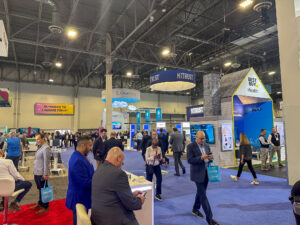HIMSS 2025 Conference Breakdown
The Healthcare Information and Management Systems Society (HIMSS) Global Health Conference and Exhibition, one of the industry’s largest gatherings, returned to Las Vegas in March 2025, bringing together an estimated 28,000 attendees from across the healthcare technology ecosystem. Our Digital Health KC team was there to identify opportunities for Kansas City’s health innovation community and gather insights on the latest developments in health IT and digital transformation that could impact our regional ecosystem.
Key Conference Themes
HIMSS President and CEO Hal Wolf set the tone in his opening keynote, declaring “2025 is going to be a year of fundamental change – worldwide.” The conference coalesced around six major themes: interoperability, artificial intelligence, cybersecurity, smart health, patient engagement, and health equity.
Wolf cautioned against a common pitfall in digital transformation summarized as “NT + OO = COO” (New Technology plus Old Organization equals Costly Old Organization), emphasizing that implementing new technologies without reimagining workflows yields limited value. This theme of organizational transformation alongside technological innovation resonated throughout the event.
Healthcare System Transformation Showcase
Samsung Medical Center (SMC) was highlighted as a compelling case study in digital transformation. Dr. Seung Woo Park detailed SMC’s journey from becoming film-less in 1996 to fully paperless by 2008, saving 27 tons of paper and optimizing 1700 m² of hospital space. Their EMR system, DARWIN, initially faced overwhelming difficulties when attempting a comprehensive “perfect system” approach, but ultimately  succeeded after pivoting to an agile strategy focused on essential features first.
succeeded after pivoting to an agile strategy focused on essential features first.
SMC demonstrated how AI solutions streamlined repetitive tasks for nurses, reducing burnout and decreasing turnover from 9% to 5%. They introduced nursing assistant robots and social robots to support patient care, particularly for children, highlighting the balance between automation and empathy in healthcare delivery.
AI Evolution
The conference revealed AI applications extending far beyond ambient clinical documentation and diagnostic support. New use cases included patient engagement tools, rural healthcare coordination, medication management systems, and platforms harmonizing disparate research data.
General Paul Nakasone emphasized cybersecurity and AI infrastructure development, describing this moment as the “Sputnik moment for science and tech.” He noted that organizations “don’t have to be the fastest to survive, just not the slowest” in adapting to these technologies.
Digital Health Investment Landscape
The “Interoperability: Fueling Digital Health Innovation with Data” panel provided a financial outlook on the sector. While investment has declined from pandemic peaks to approximately $10 billion annually, when adjusted for inflation, it remains similar to pre-pandemic levels, with more concentration in “mega funds.”
Investment continues focusing on AI, weight care solutions, and chronic condition management. The panel highlighted growing opportunities in wearable technologies that not only collect data but provide actionable clinical insights and care solutions.
Representatives from Northwell Health and Elevance Health emphasized that startups seeking partnerships should demonstrate technical ease of implementation, clear outcomes, and operational plans for implementing those outcomes. For potential pilots or implementations, they stressed the importance of trust, clinical safety, and understanding the healthcare system’s payment models and priorities.
Innovation Resources
In an exhibit hall dominated by established players accustomed to the institutional environment, it was encouraging to see a growing trend of companies and health systems highlighting their accelerator programs and investment offerings designed to foster innovation and commercialization. One example, The Mayo Clinic Platform booth offered insights into their commercialization lifecycle program. Though it does require substantial investment, they have a unique offering that allows participants access to large amounts of data for testing. We visited another health system booth that was represented exclusively by their Office of Innovation.

The conference highlighted a trend toward “home hospital” models, with Best Buy demonstrating care-at-home devices supported by Geek Squad for technical assistance. However, rural healthcare innovations remained limited beyond shared EHR systems and focused cybersecurity initiatives, with Microsoft releasing a white paper specifically addressing the rural hospital cybersecurity landscape.
Looking Ahead
HIMSS 2025 reflected an industry increasingly focused on system-wide transformation rather than isolated technological advancements. The integration of social determinants of health data, progress in interoperability standards, and development of robust AI applications all point toward a more connected healthcare ecosystem.
As Dr. Park from Samsung Medical Center noted, “Solutions created in one part of the world can and should be utilized for better care across the globe.” This collaborative spirit, combined with rigorous standards and thoughtful implementation, offers a promising path forward as healthcare technology continues to evolve.
For digital health innovators, the clearest message from provider organizations was the importance of easily implemented solutions that demonstrate clear outcomes and teach users how to leverage those outcomes effectively. As one panelist noted, “Today’s provider-facing tools will be tomorrow’s patient-facing tools,” suggesting that the future of healthcare technology will increasingly place capabilities directly in the hands of patients themselves.
What This Means for Kansas City
For the Digital Health KC community, these insights present both challenges and opportunities. Our region’s robust healthcare infrastructure, combined with our growing technology sector, positions us uniquely to address the interoperability and AI implementation challenges highlighted at HIMSS. The conference reinforced that our focus on fostering collaboration between established healthcare providers and innovative startups aligns perfectly with industry needs.
Several Digital Health KC members were recognized during the conference, with the Missouri Department of Health and Senior Services specifically mentioning our CradleKC Data Sharing Network project. As we continue building Kansas City’s reputation as a hub for health innovation, these connections and visibility at national conferences like HIMSS provide valuable pathways for our community members to scale their solutions beyond our region while addressing the most pressing challenges in healthcare today.

